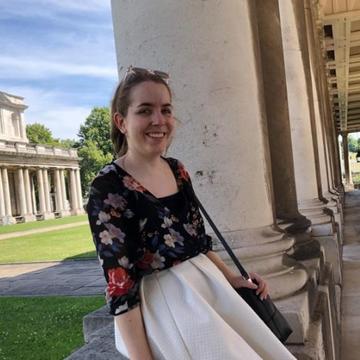History Careers - a tour of common career destinations
The skills gained through the study of history are skills for life. Research skills don’t just apply to a single career, they are the single most useful tool for transitioning careers and exploring new career paths.
Nikita Hayward graduated from Oxford in 2015 with a BA in History. She attended a Catholic School and was the first person in her family to attend university.

Career Summary
British Council Teaching Assistant (August – December 2015)
British Council Scholarship Student (February – July 2016)
English Tutor (September 2016 – February 2017)
Exams Invigilator (April – August 2017)
Junior Fellow (August – December 2017)
Marketing Assistant (March – August 2018)
Technical Editor (September 2018 - December 2019)
Content Writer (January – February 2020)
Proof-reader (March – October 2020)
Freelance Editor (November – December 2020)
Special Education Needs Learning Support Assistant (January 2021 – present)
As is apparent from the number of jobs I’ve had since graduating, my career path has been far from straightforward and has largely (until the coronavirus pandemic) been based around a combination of casual work and short-term stints abroad. I feel like I’ve toured around most of the common career destinations for History graduates; education, further study, marketing, editing and writing, taking the scenic route to where I am today.
Although it means I haven’t really worked my way upwards, and I’m probably not earning as much as most people who graduated at the same time as me, I don’t regret the opportunities I took to live, work and study abroad while I had the chance. I’ve studied Mandarin Chinese in China with the British Council, worked at a school in Uttar Pradesh, India, been a Junior Fellow at Bangladesh’s only independent university for women and worked as a marketing assistant for a travel company based in Hanoi! I used my Chinese language skills in my job as a Technical Editor for one of China’s most famous technology companies, and ultimately this role enabled me to transition into a graduate-level editing role at a City firm in London on my return to the UK in early 2020.
I’ve been interested in volunteering since my time as a Moritz-Heyman scholar at Oxford (now the Crankstart scholarship programme). More recently, volunteering as a phone buddy with charities such as Aphasia Reconnect, and The Stroke Association has enabled me to turn my career towards the Special Needs field.
I’m also a big believer in the power of (paid or funded) internships for university students. The Careers Service at Oxford supported me in getting an internship to work in a Naval Museum in Washington DC at the end of my first year, where I had my first taste of living abroad and gained valuable work experience in the education, arts and heritage industry. In addition, I was able to travel to China in the summer of my second year on a Li and Fung scholarship, and I have not only returned to China twice since then, but I’ve remained a part of the international Fung Scholars network which I still contribute articles to.
Many people doubt the utility of a history degree, but the skills gained through the study of history are skills for life. Research skills don’t just apply to a single career, they are the single most useful tool for transitioning careers and exploring new career paths. Furthermore, I’ve found that the ability to take in and summarise large amounts of information and explain this information concisely is invaluable. Not only is this relevant to writing and editing jobs, but also in the education, travel and public sectors where concepts need to be simplified and disseminated.
Navigating (or rather, shaping) a career path is no mean feat, it involves keeping an open mind and remembering that you don’t need to plan your entire future – just have a plan for your next step! I brainstormed a huge list of sectors and their associated jobs at the end of my degree, and then started gaining work experience in different areas to narrow down what I wanted. This process has taken several years, but I’ve learned an incredible amount, taking advice from other Oxford alumni and the Careers Service since graduating.
Overall, my advice for graduates is that the nature of work is constantly changing; temporary, self-employed, part-time and remote working are no less valid than a full-time, permanent position. Having worked in the public, private and charity sectors in the UK and beyond I can genuinely say that the one job title I’ve never held – history teacher - is the one everyone expected me to have held by now. It’s not too late, but I think young people should continue to weigh up the advantages and disadvantages of gaining experience in a fixed career vs gaining new skills which could be transferred to several different positions.
Most people think that their 20s are about becoming a “professional” at something, instead I would argue it is a great time to invest in building up the skills that will make you professional in whatever you turn your hand to.



